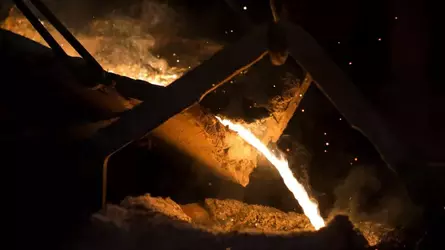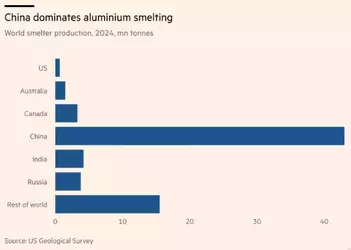
Smelting is an energy-intensive but crucial step in the production of the metals essential for a range of industries from energy to defence and technology © Ty Wright/Bloomberg
Camilla Hodgson in London and Jamie Smyth in New York
Published yesterday
High electricity costs and an intensifying battle with Big Tech for power are hampering US and European policymakers’ efforts to reshore strategically important metals processing industries, executives say.
Washington and Brussels are offering billions of dollars of taxpayer funds for smelting, processing and mining projects for metals such as copper and aluminium, in order to break China’s stranglehold on the industry. The US has also imposed punitive tariffs on imports in a bid to protect domestic industry.
But senior executives told the Financial Times that more support was needed to make western smelting and processing profitable, while Silicon Valley companies were pushing up the cost of power in the US.
“The most important factor deciding where you actually build a smelter is a long-term competitive power price,” which accounts for about a third of an aluminium smelter’s costs, said Trond Olaf Christophersen, chief financial officer of major aluminium producer Norsk Hydro.
He said that in the US, smelters were vying for electricity contracts with technology groups, which were willing to pay much higher sums in order to develop the data centres that underpin the artificial intelligence revolution.
Big Tech had “a much higher ability to pay for the power compared to an industry like aluminium”, said Christophersen.
One mining industry veteran characterised the dynamic as “not [US aluminium company] Alcoa versus China, but Alcoa versus Google”.
Smelting is an energy-intensive but crucial step in the production of the metals essential for a range of industries from energy to defence and technology. China dominates the sector, with European and US smelters increasingly struggling to compete with its scores of new state-backed factories.
China now controls more than half of the world’s smelting capacity for aluminium, according to the US Geological Survey. It also leads in the processing of other critical minerals, including rare earths and lithium, a trend that has concerned policymakers in the US and Europe.

While smelters required long-term contracts for power at costs of about $40 per megawatt hour, Big Tech companies had penned agreements for upwards of $100 per megawatt hour, the US Aluminium Association said this year.
“Large-load customers remain willing to pay premiums to secure supply,” said consultancy Wood Mackenzie, adding that power prices in the US would “grow steadily in real terms”. Alex Christopher, senior aluminium analyst at market analysis group CRU, said the proliferation of data centres in the US would “only act to drive up competition for limited transmission capacity, forcing up prices”.
The Aluminium Association estimates that a single new aluminium smelter would use about the same amount of electricity each year as a city such as Boston or Nashville.
Although US power prices are below those in Europe, which remain elevated following the energy crisis triggered by the war in Ukraine, average costs last year were almost double those in Canada and significantly higher than in Norway, according to data supplied by Hydro.
Guido Janssen, chief executive of zinc and lead company Nyrstar, said many western smelters were operating on razor-thin margins. “What we need is competitive electricity prices, that’s key,” he said, adding that power prices in Europe were especially high.
The opening of new smelters in the US and elsewhere would also require government support, such as grants and “de-risking” mechanisms, such as a guaranteed minimum price and buyer, he said.
Nyrstar is planning to expand its US facilities to enable the production of germanium and gallium — essential for the defence and tech sectors. But Janssen said it would need government funds to be profitable. It is in talks to secure financial support.
The company’s lead smelter in Australia was lossmaking and “we don’t see this changing” without government support, Janssen added.
US authorities are in talks with two companies, Chicago-based Century Aluminum Company and Emirates Global Aluminium from the UAE, over incentives to build the first aluminium smelter in the US since 1980.
EGA said its project was contingent on the company securing a “competitive long-term power supply” and government financial support. Century declined to comment.
Source (Archive)